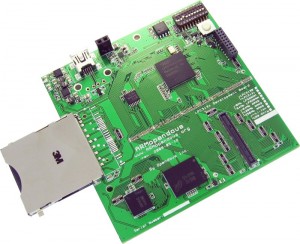This is a follow-up on my “getting the new toy” from a week or so ago. An Eee PC S101.
I didn’t like easypeasy on it. It seems that distro is more or less Ubuntu Netbook Remix (UNR) with a little EEE flavor applied. What’s not to like about it? They seem to think that because this is a netbook, normal UI guidelines no longer apply so therefore they’ve scrapped the ordinary main desktop (and its menu) concept and instead have a new full-screen “app launcher”. That’s not too shabby, but it comes with another idea that I can’t accept: they run all applications in full-screen mode by default. And I couldn’t figure out how to alter that default.
And I couldn’t figure out how to alter that default.
Full-screen might be fine for some apps at some times, but then I’d like to explicitly ask for it instead of having to learn now to “unmaximize” each app (they’ve also removed/altered the window decorations so there are no standard three buttons on the upper right corner of the maximized windows). To top it off, it seemed that the latest easypeasy isn’t built with the latest ubuntu and thus it failed to connect with my 3g modem…
Instead I took the base version of eeebuntu for a spin and that is so much closer to what I want in a linux. It’s ‘base’ so it only comes with the bare minimum. It has no fancy alternative UI but relies on the traditional well-proven and by me liked X11 (gnome) desktop.
I inserted my Sony Ericsson MD400 USB 3g modem that I got from Telenor/Bredbandsbolaget and within a few seconds I was online. It couldn’t have been a much smoother ride.
I know people have expressed opinions that it’s a better idea to use laptops/netbooks with an internal 3g modem so that you don’t have to use any external devices so that it’ll be more slick and all. I think I was of that opinion as well until I got this usb thing in my hand. It’s basically just a tad larger than any ordinary USB memory stick (70 x 28 x 15 mm) so it’s really not much “in the way” or disturbing when inserted in a laptop and it comes with windows drivers on it (as it dual-serves as a usb mass-storage device as well). It makes it a perfect little device to move between different laptops. We have so far three laptops in our household and now I can get any of them onto 3g if I want to.
A little side-note on my eeebuntu install on the SD card: when I ran unetbootin I selected to install the “live/install” version on the hard drive (which of course is a SSD but anyway) to then install it on my SDHC card, but it simply wouldn’t work. I tried three times and every time it froze somewhere in the middle of the install. When I then re-ran unetbootin and made a boot usb stick, and then ran from there instead when I did the install, it worked perfectly…


 ports in regards to the mainline Linux tree? They’re both using ARM cores (of course).
ports in regards to the mainline Linux tree? They’re both using ARM cores (of course).

 There’s already a bazillion instructions on how to install and run Linux on your EEE PCs out there, but they all seemed to miss one (for me) crucial little detail:
There’s already a bazillion instructions on how to install and run Linux on your EEE PCs out there, but they all seemed to miss one (for me) crucial little detail:

